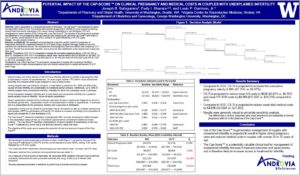Potential Impact of the Cap-Score Test™ on Clinical Pregnancy and Medical Costs in Couples with Unexplained Infertility
Joseph B. Babigumira1, Fady I. Sharara2, 3, Louis P. Garrison Jr.1
1Departments of Pharmacy and Global Health, University of Washington
2Virginia Center for Reproductive Medicine, Reston, VA
3Dept of Obstetrics and Gynecology, George Washington University, Washington, DC
 Objective: Sperm capacitation is a necessary precursor to fertilization. The Cap-Score™ was developed to assess the capacitation status of men. This enables personalized management of infertility for some couples by selecting among timed intra-uterine insemination (IUI), versus moving immediately to in vitro fertilization (IVF) and intracytoplasmic sperm injection (ICSI) in those with a low Cap-Score™. The objective of this study was to estimate the differences in clinical pregnancy rates and medical costs comparing the use of the Cap-Score™ with timed IUI (CS-TI) and the current standard of care (SOC), namely 3 IUI cycles followed by 3 IVF-ICSI cycles.
Objective: Sperm capacitation is a necessary precursor to fertilization. The Cap-Score™ was developed to assess the capacitation status of men. This enables personalized management of infertility for some couples by selecting among timed intra-uterine insemination (IUI), versus moving immediately to in vitro fertilization (IVF) and intracytoplasmic sperm injection (ICSI) in those with a low Cap-Score™. The objective of this study was to estimate the differences in clinical pregnancy rates and medical costs comparing the use of the Cap-Score™ with timed IUI (CS-TI) and the current standard of care (SOC), namely 3 IUI cycles followed by 3 IVF-ICSI cycles.
Design: Decision-analytic modeling
Materials and Methods: We developed and parameterized a decision-analytic model of management of unexplained infertility for a hypothetical woman 35 to 37 years of age, using her own eggs, based on data from published and unpublished sources. Model parameters are shown in the table. We calculated the clinical pregnancy rates and medical costs comparing CS-TI and SOC. We conducted univariate sensitivity analyses. The test has not yet been launched, and no price has been established, so the medical costs include only other costs.
Results: Compared to SOC, CS-TI is projected to increase the cumulative pregnancy rate by 1.7% (94.2% vs. 92.5%). This increase varies from 0.8% to 3.2% depending on the assumed pregnancy success rate of IVF. Compared to SOC, CS-TI is projected to reduce mean medical costs by $4,621 ($19,319 vs. $23,941). Sensitivity analysis places the range of this cost reduction from $2,700 to $6,500 per individual patient depending on the costs of IVF-ICSI. CS-TI is projected to reduce mean IUI costs by $715 ($6,734 vs. $6,019) and mean IVF-ICSI costs by $3,906 ($17,207 vs. $13,301) compared to SOC.
Conclusions: Use of the Cap-Score™ to personalize management of couples with unexplained infertility is projected to result in higher clinical pregnancy rates and reduced medical costs.
Support: Androvia Life Sciences
| Parameter | Baseline | Sensitivity Range (SR) | Reference |
| Costs (all 2016 $US) | |||
| IUI | $2,550 | $1,275 — $3,825 | Expert (+/- 50% SR) |
| IVF-ICSI | $15,000 | $7,500 — $22,500 | Expert (+/- 50% SR) |
| Pregnancy Probabilities | |||
| IUI in SOC | 0.125 | 0.100 — 0.150 | Expert (+/- 20% SR) |
| IUI after Cap-Score | 0.400 | 0.320 — 0.480 | Expert (+/- 20% SR) |
| IVF-ICSI | 0.519 | 0.415 — 0.632 | SART weighted mean for 35 — 37 (+/- 20% SR) |
| Low Cap Score | 0.385 | 0.308 — 0.462 | Travis et al. poster (+/- 20% SR) |
